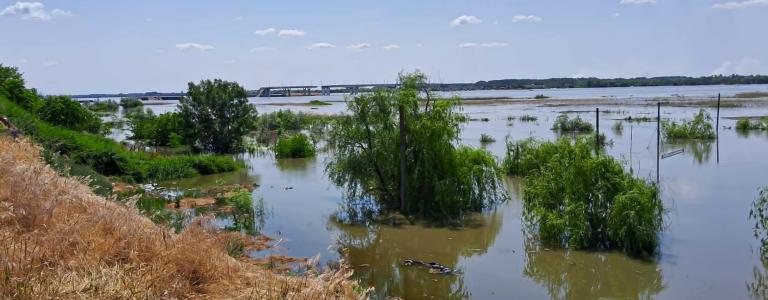Destruction of Ukraine's Nova Kakhovka Dam Marks Catastrophic Turn
The International Institute for Sustainable Development (IISD) is deeply concerned about the destruction of Ukraine's Nova Kakhovka dam earlier this week, which has resulted in a massive humanitarian and environmental crisis. This catastrophic event shows yet again the toll Russia’s full-scale invasion of Ukraine is taking—the dam's collapse has already had a direct impact on tens of thousands of people, and it is likely to affect hundreds of thousands more.
Already, news reports are showing widespread flooding in downstream communities, extensive infrastructure loss and damage, and the disruption of drinking-water supplies. The agricultural and environmental impacts are equally devastating, with sewage, chemicals, and fuels contaminating the Dnipro River and surrounding communities. The long-term consequences for ecosystems and biodiversity in the Kakhovka reservoir—as well as the areas downstream of the Dnipro River, the Dnipro Estuary, and the coastal region of the Black Sea—are also unprecedented.
IISD fully supports the urgent need for immediate humanitarian assistance to the communities affected by this relentless war, especially in occupied territories, and emphasizes the importance of identifying the most effective course of action to ensure the health and safety of those impacted.
Furthermore, we remain committed to working closely with the Ukrainian government, civil society, and the international community to provide support for Ukraine's recovery efforts. Earlier today, we joined a meeting with President Volodymyr Zelenskyy and representatives from other leading international organizations to hear first-hand about the devastation the country is facing and how we can help.
Together, we will find a path forward through this crisis and contribute to the restoration and resilience of Ukraine.
You might also be interested in
How Russia's War in Ukraine Threatens the Planet
Russia’s invasion of Ukraine in 2022 has resulted in the deaths so far of more than 8,700 Ukrainian civilians, including more than 500 children. It has caused a massive drop in the country’s economic output, with GDP declining by 29.1 percent.
What the Invasion of Ukraine Means for Sustainable Development
As events continue to unfold in the region, three urgent areas of concern are emerging: global food security and the hunger crisis; risks to progress on the clean energy transition; and the state of multilateralism.
Russia's War in Ukraine: Why doubling down on the Green Deal is the best strategy
As EU leaders meet in Versailles, energy is set to be a key topic. But leaders must ensure that the decisions they make to break away from Russian energy push the EU in the direction of sustainability.
Good COP? Bad COP?: Food systems at COP29
The 29th United Nations Climate Conference (COP 29) in Baku failed to build on the notable progress made on food systems at COP 28. However, it wasn't all doom and gloom.
